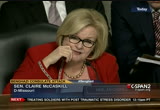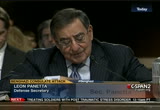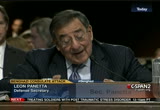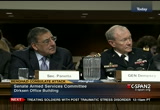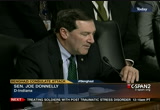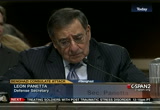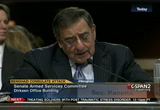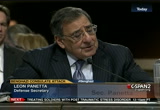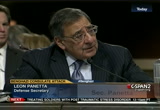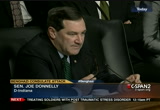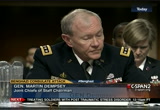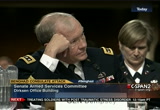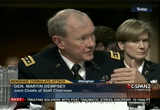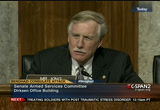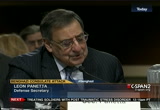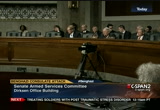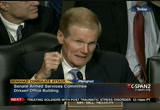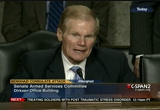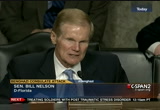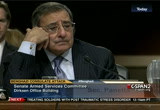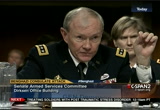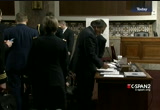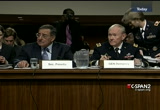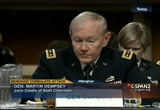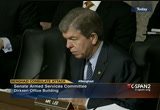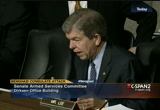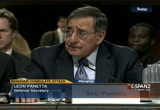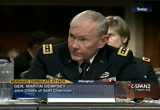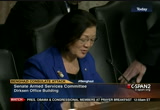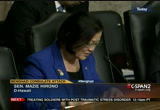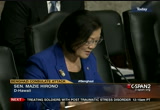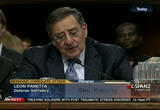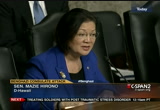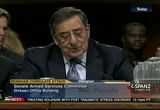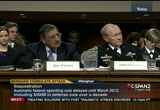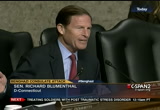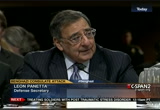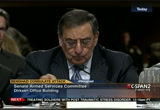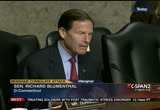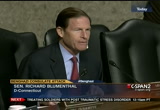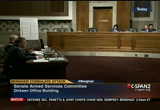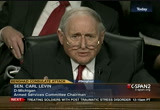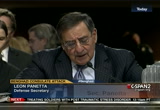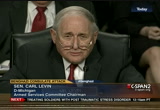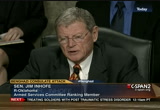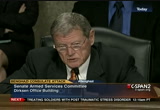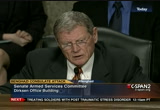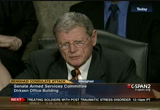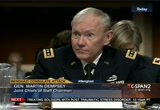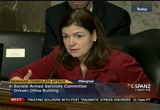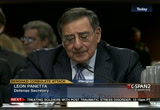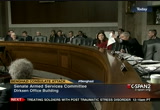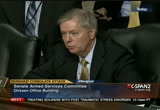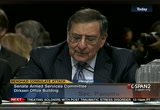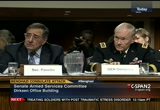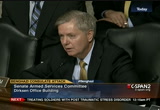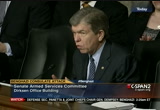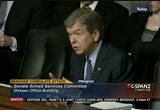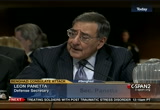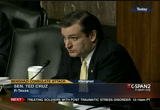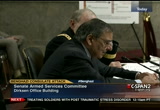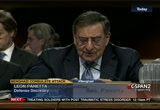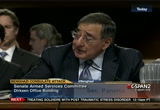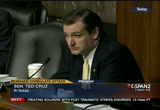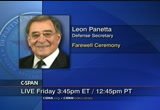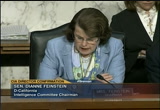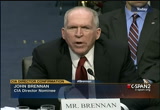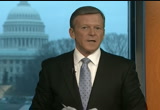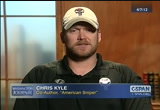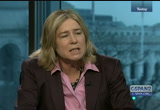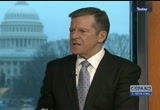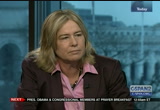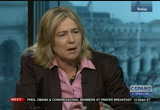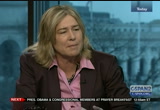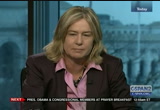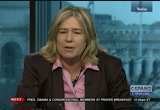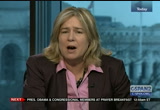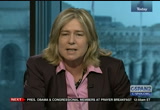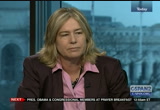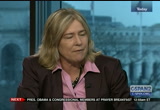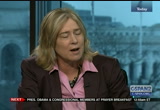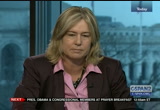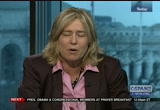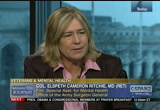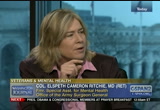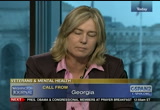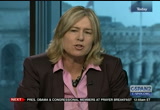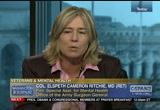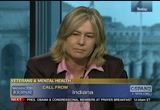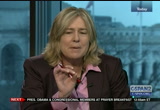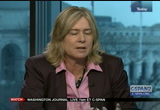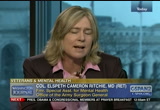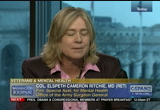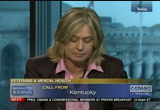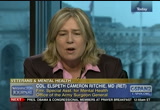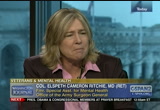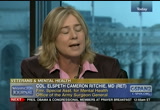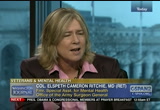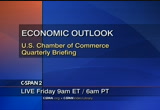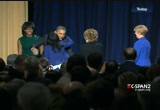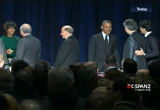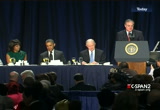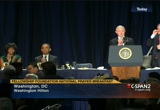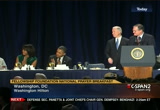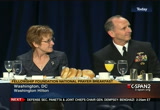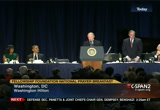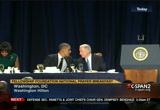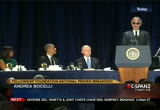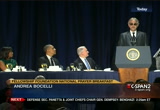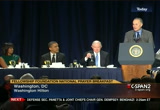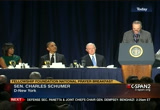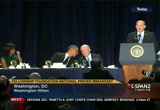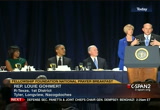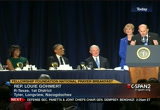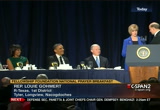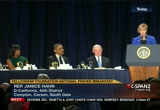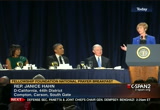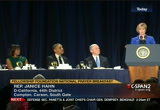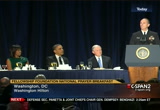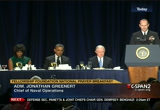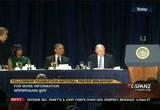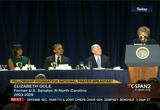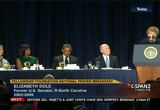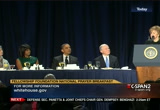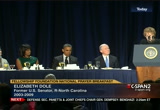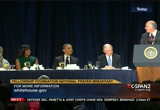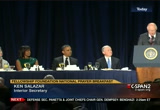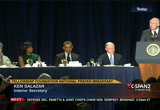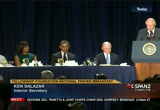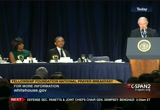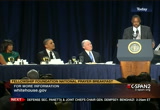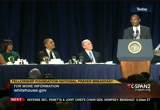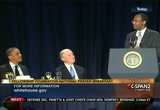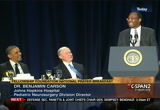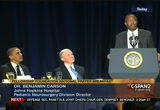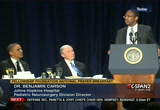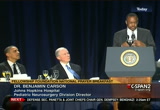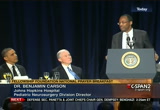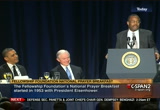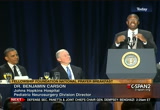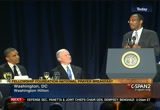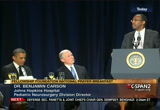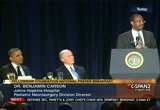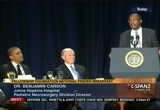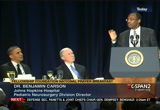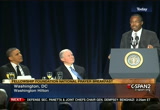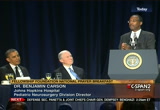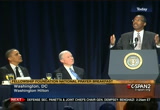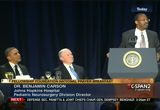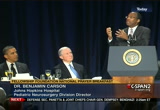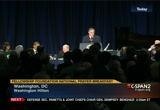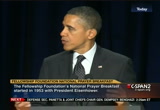tv Capital News Today CSPAN February 7, 2013 11:00pm-2:00am EST
11:00 pm
heightened security risk. and i think it's time for us to do a check on whether or not we should in fact be relying on in that local militia were contractors. >> senator, let me just commend you for the work you've been doing with regards to these kind of contract and the quality of individuals that are involved. ..
11:01 pm
to do what is inherit a government function. it's almost like a hit brick wall every i time talk about this. why is it it has to be a contract function. why can't we use the best trained military in the world to protect our most valued assets in our most dangerous places? >> i mean, i think the reality just speaking with regards to my old agency we are deployed in so many areas you can't expect the military to pop up there and provide that kind of protection. they have to get security on side and get from the very best people they can contract with. that's become the reality we're dealing with. >> because the need to integrate to the community and therefore if you have military it stands out. i can see that particularly under the intelligence agency.
11:02 pm
for embassies, it seems to me that this shouldn't be such a hard reach. thank you. thank you, general dempsey, i hope you enjoy the california weather. >> thank you very much, senator mccaskill. senator donly. >> thank you, mr. chairman. mrs. secretary, thank you for your service to this country. we are so many in your debt for time after time answering the call. thank you very, very were and general dempsey. thank you for everything so you done for our forces and for our country. and i want to express my condolences to all of the families who have suffered losses in this tragedy, and we will do everything we can to make sure it never happens again. earlier in the hearing,
11:03 pm
mrs. secretary, you said that it is not the department of defense's job to be 9-1-1, and so the question that struck me is, so when this happens and it happened so fast, and so quick, that when you responded in an hour, it may already be over by that time. are we relyingings on the home country -- relying on the home country to be 9-1-1? if so, as you go through what they're providing to us, you mentioned some are not up to our -- are not up to the quality of others at this time. how are you making that decision that we have people in harm's way and we are lying on a -- relying on a host nation that might not be up to taking care of our people? >> you know, obviously it's very important that, you know, the
11:04 pm
ambassador determined what is the situation and whether or not, you know, there's a need for action. i mean, the 9-1-1 is basically the host country that has to respond quickly and provide immediate security around. if that's not there. you have to have security within the embassy itself. that f that isn't there. you have to intelligence giving you a heads up it's a dangerous situation and subject to an attack. and then if that's not there, obviously we have to be hopefully in a place where we can be able to respond if we have to. i mean, that kind of your overall 9-1-1 to try to deal with situations in the embassies that are out there. >> because my concern as much as some of these host nations are our friends, that and their ability, obviously, is not as successful as our ability in defending our own.
11:05 pm
and so how do you determine other than the ambassador telling you we think we're here or there. are there reviews done at department of defense when you look and say in a benghazi or, you know, i don't want to go city by city for obvious security reasons. when you look at them, how often do you determine we'll take a look this week and see where with e are security wise. i know, state is a big part. >> the best thing we did is state asked us to join a team that would look at security at 19 embassies and determine what was needed there in order to better secure those facilities. and i think based on that, it gives us the opportunity to then demy additional -- additional marine if we have to take additional steps to make sure that those embassies are not vulnerable. so we do work with the state department when asked to try to help provide some guidance with
11:06 pm
regards to security. >> how often is a review done in some of these places, for instance, a benghazi. do they -- is it on a -- when the ambassador says, things are getting tougher, or every couple of weeks is it looked as it is deor ituated or gotten better. what kind of matrix is used? >> well, you know, look. the primary -- the primary matrix for that has to rest with the state department and the ambassador within that country to be able to review just exactly what is the degree of threats that they are cron fronting and what -- confront the and what actions they should take in order to deal with that. the defense department is in a position where we will respond. if we're asked to do something. we will do it. but we're not out there basically making judgments about you know what embassies are
11:07 pm
secure or not secure. what are the threats in the various embassies. you have to leave that up to the chief of station. and chief of mission to be able to make that determination. >> with our neo plans that with have, we have approximately 285 diplomatic missions out there. how far along are we in having plans for all of them? >> as we said we have embassies throughout in the world and not all, obviously are benghazi or tripoli or tunisia. the reality is that in most countries, in the world, we can rely on the host country to provide security. they're there. they're willing to do it. they do a good job. there are some of these embassies in some of these more
11:08 pm
volatile countries that are of concern. and those were the nineteen that we're designated by the state department as ones we had to look at more closely and develop a better approach to providing security. because there part of the problem is the host countries are not very good at providing that kind of security. >> is there a -- it seems this is so much of a distance in time challenge that when it happens, how quickly can we respond? how far away are we? is there a almost like a playbook for the ambassadors for the people in those facilities that here's the steps to follow. jump on them immediately if it dpunlt click we go this or that? >> the best playbook the general responded this as well. the best playbook is an ambassador who says, we have got serious security problems here.
11:09 pm
we are threatened. and therefore we need take steps to reduce the number of personnel in our embassy. we need to take steps to evacuate, if we have to. and we can then prepare our forces to be able to provide help in that situation. that's the best kind of situation in terms of being able to respond. >> yeah. just if i could add, senator. each embassy has a resident security officer, well trained and an emergency action plan for every embassy. generally speaking it's updated annually. i have sat on country teams in various jobs, and then the anticheys are integrated to the process. so the process exists. what senator secretary clinton asked me to do soon after benghazi was to collaborate with her to make sure we can make improvements to the system. >> general, thank you for your
11:10 pm
service. mr. secretary, it's been an honor to serve in our government. thank you, mr. chairman. >> thank you, senator donnelly. senator king. >> mr. secretary, and general, thank you for being here. i wouldn't like to associate myself with senator cruz's comments i regret being a first year senator and not being able to work with you. i'm in the process of hire ang legislative assistant for the committee. if you go back to california, get longing for washington. let me know. i think it's rather unlikely. >> been there, done that. [laughter] i want to followup on a question from senator mckeen. -- cain. given it was close in terms of transportation time, why was that not an option to get people there faster? was it question of who and what is at the crete pace? general dempsey? >> the bases we have in southern
11:11 pm
europe and the met mediterranean area are generally speaking have aircraft, first point i made is that it wasn't the right tool for the particular threat we faced. secondly, the aircraft we have in europe, generally are there in support of nato, and on a different alert posture. that was not among the forces. the aircraft were not among the forces that we had at heightened alert. it remitted to the boots on the capabilities that could preeffortively get to an embassy or compound to thicken the defenses if we had reason to do so. >> the troops were not at the base at the time of the? >> no. >> now to followup, you talk about everybody wants a fire station next door, it doesn't work. on the other hand, in this case, as you testified there was about a 13-15 hour practical
11:12 pm
limitation, i gather since this incident you're trying to shorten that. do you have a target? what would we like to be able to do? particularly in the hot spots which we can identify in advance. >> we're not done making adaptations. what we did initially was take the steps the commander in the forces and and the standard had generally plus six. information to plus six to lift off plus transit time. we can reduce the alert posture and do so watching not only intelligence but also watching things like the social media. sometimes these events crop up out of the social media, believe it or not. and secondly, then -- but you can't reduce the traps sit time. that the limiting factor in of a fry come in particular. when i say we're not done making adaptations. we asked each of the services to exam their capability to build
11:13 pm
additional reaction-like forces. small, rapidly deployable forces. a small for the marine corps., marine air ground task force and the army is looking at some options as well to increase the number of these resources across the globe. where the limiting factor there always be basing specially in africom. >> you are moving the fire stations nearer then? >> we are trying to build more firemen. the question is whether i can build the station to house them. >> i got. >> secretary panetta. you're in a unique position. the committee, as you know, considering nominee to be your successor. senator hagel. later today i'm going to be talking to john brennan. can you give a brief assessment of the two gentle and the capability and the readiness to assume the positions? >> yes, certainly.
11:14 pm
obviously that's something that the committees now have the opportunity evaluate. but in my view, both of them are outstanding individuals that have a great deal of experience and capability to be able to perform in an outstanding fashion in each of their jobs. senator hagel is someone who, you know, served in the military, worked up here on the hill. understand the issues that are involve there had. i think can be a very effective leader at the pentagon. john brennan is somebody i worked with the at the director of cia and continued to work with in this capacity. i found him to be responsible about how we can effectively conduct operations again al qaeda and against those that would attack this country. he is -- as somebody said, a straight shooter. somebody who, you know, gives
11:15 pm
you his best opinion, he doesn't play games. he is somebody who i think, you know, can honestly represent the best protection in this country in that job. >> thank you very much. i want to thank you for your forthright comments today about the sequester. ironically, as i take some notes what you said and in the statement. it appears as of today the greatest threat to american national security is the united states congress. thank you, mr. secretary. thank you, senator. senator nelson. after senator nelson, the first round will be over. there may be a number of us that want a few minutes on the second round. you have been here for about three hours and you may need a fife or ten minute break. do you want that immediately following senator nelson or go right through? i can't guarantee how many
11:16 pm
senators will come back and want two or three minutes each. >> if we can take a short break. >> after senator nelson, we'll have a short break. >> do you need a short break before? [laughter] mr. chairman? >> since you ask. did okay. i'll make it quick. first of all, thank you mr. secretary. you have been an old and dear friend, and you have served your country exceptionally well. thank you. i want to just hit a couple of things because we've had accusations made here that there was seven hours of warning. the truth is when.
11:17 pm
i want you to answer what you can in an unclassified setting. the so-called first attack was not an attack of shooting, wasn't it? and suddenly the guards out front disappeared and people walked in to the compound? >> that's correct. >> and this occurred until someone fire bombed the main building, which housed the ambassador in the mission; is that corrected? >> that's correct. a response team coming from a nearby location tried to get there one route and determined that route was not the correct
11:18 pm
one and went another route. is that correct? correct. >> but then they got there, got inside, rescued one of the people but in the process of getting them out on all of the smoke and the fire, the ambassador was not retrieved from the building. >> that's right. >> okay. and then thicks stopped -- things stopped and they stopped for a number of -- as the rescue team and the survivor retreated to the annex, which was some distance away, i don't recall the amount of distance. >> a couple of miles. >> okay. and everything stops. an hour or two later, then there
11:19 pm
was an attack on the annex, and is it true that the main building at the annex was not penetrated? >> that's correct. >> okay. and then that subsided; is that correct? >> that's correct. >> for a period of some three hours or more, nothing happened? and then the attack of the mortars, which is going through the roof that's what killed the two that were there in that building. >> i think they were actually on the roof. that's how they got . >> i see. well, then that is a lot different from saying that suddenly you had seven hours of warning. that what appeared to start,
11:20 pm
stopped a retreat to an annex an attack there that was successfully re-- repelled -- it's stop. and hours later a mortar attack. so i would, mr. chairman, would like the record to show that what has been chairized -- characterized here is in the evaluation of the decision makers about their ability to get a response team in there. is it also correct that the response team from tripoli were landing on or about the time that the mortar attack started? >> that's about right. when they landed, they immediately went there and came under fire. >> okay. and finally, i just say going to the sequester to respond to
11:21 pm
these kind of attacks in the future and there will be these kind of attacks in the future. scwetioner certainly wouldn't put you in a better position in order respond would it? >> absolutely not. we would have a hard time trying to provide the resources we would need in order to be able to do this. >> thank you, mr. secretary. >> if i could. i want to make one comment related to your crinology. because i think it's important. once we started moving forces, nothing stopped us, nothing slowed us. the only adaptation we thought about making was for a period of time we thought we were going to be entering a hostage rescue because we didn't know where the ambassador was. but once we started forces moving, they didn't slow, they didn't stop.
11:22 pm
>> you didn't know the situation with the ambassador until hours later when in fact some libyans had come in to that facility and tried to rescue him and found him at that point unresponsive from smoke inhalation. >> that's right. >> okay. thank you, mr. chairman. >> thank you, senator nelson. we're going to take a ten minute recess. [inaudible conversations] [inaudible conversations]
11:23 pm
[inaudible conversations] [inaudible conversations] we have two senators, one of whom who is here and the oh coming. who have not had a first round, and senator blunt is the first of those two senators who has not had a first round. i'm going call on senator blunt. >> thank you, i was at the press conference talking about a mental health bill i think general dempsey will have impact on people who left the military looking at community health center as a mental health model.
11:24 pm
on one -- one question i have. i saw general dempsey in your comments over the weekend i think it was on the "state of the union" looking back. you don't know on anything you could have done differently. was that your response? that was my response. >> how about looking forward? >> what would you do differently or what we -- let's do that in two questions. what would you do differently if the same circumstance occurred again and what are you doing to prepare for a different kind of response? >> two things. one is the accountability review board, the pickering review board made 29 recommendations in both the state department and we have accepted and will implement all of those separately. secretary clinton and i agreed to review of -- described as a
11:25 pm
new norm to account for the lack of host nation capability in some parts of the world. the secretary mentioned that some of the results of that include the augmentation of the marine security guards changing the posture level, directing combatant commanders to have additional forces on as a reaction forces. so we're continuing. they can respond quicker than seven hours. if we had the same seven hour window, could we get somebody there? >> senator, the answer is in
11:26 pm
many place, the answer is yes. the limiting factor in africa are bases, frankly. we continue have a base architecture with the exception of jay on the east coast we could position forces. that requires earlier decision making collaboratively with the state department, and preemptive request and the earlier decision making can be to close the embassy as we did recently. the state department did in the central african republican and thinning it out as they did in cartoon or it can be asking for additional security forces. >> caller: 0 what other area? i know at least for the first several years after 9/11, there was always an active discussion of what was going to happen on 9/11. now on 9/10, they did a video where he talked about the libyan
11:27 pm
being killed and how we by americans and how they must get even. was there, secretary panetta. was there any evaluation what it might mean and whether we should be thinking about how we should respond to the threat? >> my recollection it was part and parse l of looking at the general counterterrorism situation that we were concerned about in the region. and the issue, frankly, that was probably more preimminent the day before was what would be the impact of that video that was coming out that enblame flamed a lot of the situation in the area. >> the -- well, i would have thought from the video that there would have been some sense of libya could be a target, and i don't know if we have stepped
11:28 pm
back from our view that al qaeda was able to do things. i'm not saying it's a total al qaeda operation, but clearly al qaeda's out there talking about a libyan that was killed, and how we needed to get even with the americans for that. the day before it happened, it concerns me there appears not to have been the evaluation that went on pretty aggressively for the first eight years or so after 9/11 and i hope one thing surely of getting out of this, there are terrorists in the world and they want to do us harm. >> no question about that, and, you know, as you know, senator, there are elements of al qaeda throughout that part of the world, and they represent a continuing threat in that part of the world. that's why we're doing the operations we're in yemen and doing the operations operations in somalia, and frankly
11:29 pm
assisting the french with regards to aqim. we do have to be vigilant about the elements of al qaeda. where they are, where they can be, and the kind of threat they represent. >> one -- my last question -- we call on anybody else who had friendly forces and benghazi to come to our assistance, the talkers -- turks people we helped in the area recently by coming to their assistance. could we have asked for any help that might have already been on the ground there? >> the only military forces were thereto 17 february malicious and the call went to them immediately. they had been supportive of ever since the . >> there were not alternative security forces that other countries had. >> noun we were aware of. >> we could have called on if we didn't -- i guess we didn't call on them. we have come to the aid of -- i
11:30 pm
think -- there was a -- an attack on someone from turkey within the previous month, and we sent some people to that scene. i've always wondered why we didn't try to further secure the people we had there if we couldn't get people there. and you're telling me, general, there was nobody to call on. >> i'm telling you, i wasn't aware of any nor was the commander. >> are we evaluating like we're going to use groups like february 17th again or not? >> absolutely. >> okay. >> thank you, mr. chairman. >> thank you, senator blunt. senator? >> thank you very much, mr. chairman. and secretary panetta, general dempsey thank you for your testimony for the last number of hours. of course, secretary panetta i join my colleagues in thanking you for your service to our country. you came out of retirement to help this country serve in my
11:31 pm
challenging times. my best to you in your future. and did an outstanding job at the cia and pentagon. especially today as we talk about the need to coordinate the efforts across various democrats, i think your experience will be a very much -- miss. you lead the men and women with tremendous competition, passion, and conviction. i thank you very much. of course, i'm very envy use of the fact you get to go to a beautiful place the monterrey peninsula. the place i visited often. for the americans who lost their lives in benghazi, ambassador chris stephens, sean smith, tie roan woods and glen doorty. they were heros and represented our country proudly while understand there are risks involved in diplomatic work. i want to ensure as to all of us
11:32 pm
that we do everything question to -- everything we can to ensure the safety of our people who take on the assignments and often dangerous circumstances. the state department's accountability review board described a gap in intelligence coverage for the area and it is one of the their findings. no. 4. mr. secretary, drawing from your experience at the pentagon and the cia, in your estimation what caused this gap in intelligence? it was a tasking prioritization issue with just too much areas to watch? are there structure impediments within or among the intelligence organizations that lead to the tragedy of benghazi? how would you improve the situation? >> well, it's a huge challenge. i mean, you know, obviously our ability to develop sources we
11:33 pm
needed in going after al qaeda and pakistan was critical. same thing was true in afghanistan to be able to go after the targets there. develop those resources in yemen. we had to develop a whole base of better sources in order to be able to conduct the operations there. same thing was true in somalia. so there's a whole issue of prioritizing what are those areas where we have to develop essential resources inferred to get better intelligence. and i'm sure that was one of the things involved here. secondly, there was, you know, was a situation where libya -- to some extend in what happened in libya i'm sure that there was an effort to try to develop the security capabilities within
11:34 pm
libya, so that they could develop their own resources to try to assist in providing that information. and, you know, sometimes if that, you know, normally in most countries, it isn't just our ability to use our own sources. we in many places, rely on other countries and their intelligence sources to be able to add to our intelligence. and libya was having much more difficult time being able to did that. i think it's for those reasons we didn't have the kind of intelligence we should have had. >> so in places such as libya, which is emerging new government, that goes in to your assessment of the prioritization that needs to occur. >> that's right. >> having learned from what happened. if we are in that situation where we can't rely on the capacity within the country's forces, i think that probably
11:35 pm
heightened priority for those areas in term of the safety of our people. >> yeah. yeah. it's obviously now that recognizing that we have got, you know, try to do what you can to develop your own sources. develop the other country's capabilities with regards to intelligence. and develop other approaches that we have in terms of technology being able to gather the kind of intelligence we need. >> and is that happening? >> yes, it is. >> i don't know if there are -- can you cite to a specific thing that is fostering this kind of change as a result of our tragedy in benghazi? >> i think the intelligence community recognizing the recommendations that came out of the accountability report are taking steps to try to ensure that gap is no longer exists.
11:36 pm
>> so in terms of just the coordination of that has -- there's some specific steps that are being taken to coordinate between the state intelligence community, and dod. >> that's correct. try to improve the ability to get the intelligence, get to the state department, and then state department based on that can make decisions as to whether or not they should request our help. >> now, in listening to your earlier testimony, i think that some of it was that there seemed to be gaps in terms of the information you were getting as what was happening in benghazi. so have steps been taken to make sure that those kinds of communication occur instay contain usely or while the effort is occurring? >> steps i know are being taken to try to improve that
11:37 pm
intelligence capability. >> can you talk a little bit more, i think i have a little bit of time on what the impact of sequestration would be for -- in terms of our ability to safeguard our men and women in these hundreds of embassies and officers throughout the world? >> well, if we sequester did take place, and we to take the amount of money that is required by sequester, we clearly the one place we would have to go is in to our readiness and paintens accounts and readiness would require we had to reduce training for our military, in each of the branches. so that the problem you ultimately confront is that while you have capable trained
11:38 pm
people in the war zone and educational where, that you lack the capability to have well-trained individuals that you can deploy elsewhere. and that creates a real readiness crisis for us. >> thank you, mr. chairman. thank you. >> thank you very much, senator. senator bloomen that is next. >> thank you, mr. chairman. i want to join my colleagues in thanking you, secretary panetta for your extraordinary service to our nation, and the personal sober and time that you are have devoted to all of us on the panel and other members of the congress. general dempsey, thank you as well for your service. and to both of you for your forthright and credible and significant testimony today explaining some answers to questions that are painful, i think, for all of us, and i know for you having attended the
11:39 pm
services and ceremonies in honor of these brave patriots and heroes, as you call them, and also your knowledge personally of them. and i'm struck as senator senator kaine was by the provocative i would prefer to call it powerful statement you offered regarding the effect on the nation readiness in the sequester and like senator kaine, and other members of the panel, i believe that we ought to do everything question to avoid those catastrophic consequences of across the board cuts and i share your -- not only in the affect on deployment but also the on readiness that results from adequate training and preparation, which in turn affects or ability to respond crisis like beb gas city.
11:40 pm
-- benghazi. all of us are fond of saying our people is the greatests a sect. that's true and failure to provide the training and career opportunities to them that are needed, i think would be unone of the most catastrophic consequences of scwetioner -- sequester. >> senator blumenthal. if i could. >> please. >> specifically with regards to something in your state electric boat and the magnificent work force up there that puts our severance together. it we have to situation where we have to cut back on maintenance and the kind of production. the worse thing can happen is losing the skills in that kind of work force. once they are laid off or don't have a job. the ability to be able to regain that kind of expertise is not easy to do. >> well, not only not easy to do. sometimes impossible to do. >> that's right. >> and and our defense industrial base is often
11:41 pm
unappreciated. the civilian work force and the tremendous skills they bring to the production and electricity boat like wise where the joint strike fighter engines are produced an where helicoptererer made across connecticut, across the country. i think the defense industrial base is under threat and it is the skill dedicated work force that is the companion asset to our men and women in uniform. and so important. i would hope that whatever the results in the next month that we can continue to keep in place that work force. and i think you share that view. >> let me turn to another area of personnel i think is very important. and because you are here for your last time and i know you will deeply regret not appearing before the panel. you can agree with me because
11:42 pm
you're not -- i'm taking advantage of your being here to raise a question about an area that i think is very, very important. the decision of the pentagon and the department of veteran's affairs to abandon the plan for a unified health care record system announced very recently. this decision is a tremendous setback for an effort that really has been ongoing for years if not decades to provide for a stream lined and timely process faster decisions on benefits, less dop indication in medical testing, more efficient cost effective treatment for both physical and mental health needs. this single unified health care system has been a long standing goal, and i am very, very regretful and disappointed that the decision has been made to
11:43 pm
abandoned it after devoting a billion dollars, so far, i think, $1 billion to create it. i would invite your explanation. >> thank you, senator. first of all, let me say. i don't believe that the idea of developing ultimately that unified system has been abandoned. it's -- what we wanted to do was we knew that developing that system has taken years, it's going to take more years, it's going to cost a great cancel of money as we do that. but in the interim, we have to do everything necessary to create interoperability between the veterans administration and defense department so that doctors who are dealing with the individuals can bring that information together. we can do that in interoperability using existing systems, we have been able to did it some of the institutions. we want to do develop that in nine other institutions to do
11:44 pm
that. question get it done by july of this year, that's why we want to stress that. i want to assure you that the work on an ultimate single system that will require new technology to be able to get that accomplished is still going to continue to be worked on. >> that's good news. it also conflicts with some of the news reports i have seen, which to quote one, secretary defense secretary leon panetta and eric announced today announced on tuesday they were scrapping the one-time plan to create an integrated electronic records' keeping system. you're saying that you and secretary shin eric tsh. >> we're not scrapping that. our intent is to don't work on that. we want to create the
11:45 pm
interoperability sooner and on a faster track so we can provide the information doctors need to create semidrink defense and the veterans' administration. if i can articulate a different way in you're adopting a first stage solution that involves interoperability but proceeding with the larger system and longer term more effective single . >> that's correct. >> thank you. thank you very much to both of you for your testimony today. it's been very helpful and thank you for your service as well. >> we're going to begin a second round and we're going to have a three minute second round and the witnesses must leave by no later than 2:30. i hope before. because we have a vote scheduled for 2:00.
11:46 pm
>> i just have two questions. first has to do with the question that was asked by senator graham. i think both of you answered this, i think maybe you, secretary panetta, how many times did you talk to the president during the day of the events, i think your answer was once during, and i think general you indicated once during. and then sort of a question as well. you mean you never got back to find out what was going on? i think you were starting to say, secretary, he has a number of other sources of important information including his own chief of staff and i presume too the chairman of the national
11:47 pm
security council or others that would be in touch with could call that are closer at hand in the white house. the hand you are in the pentagon. do you know how many times that day the president talked to the chief of staff or to the national security council people? i don't know how many times he was in contact. we were in contact with the staffs there. there was a d.c., which is deputy's meeting of the national security counsel that met that i think five or six or 8:00 that evening. in which everybody was represented including obviously national security team as well as the teams from state and elsewhere cia, dni. in addition to that. obviously our staffs were in constant touch with the white house to alert them as to, you know, what was taking place and what information we had.
11:48 pm
so there are -- it's just the nature of the white house that presidents of the united states make use of abroad sphere of staff that are involved with the issues to work the issues and continue to be in touch with him as to what is taking place. >> now relative to those unclassified talking points that we're prepared at the request of congress by the intelligence community, that were erroneous through no fault of her own, ambassador rice used bore the brunt of the criticism for the use she didn't prepare them. are you familiar either of you with the talking points? did the dia, the defense intelligence agency participate in the production of those talking points? do you know? >> we did not. we were not aware of the talking
11:49 pm
points at the time. >> do you know whether or not the dia was part of the intelligence community that prepared the talking points. >> i'm not awared they were involved. i think it was the dn, i. you don't now -- have you talk to how he could not have known or how they could not have known that the talking points they handed to rice and others were erroneous? >> i have not. >> okay. senator udall. >> thank you. i'm going try to do it fast. one more run at the same issue. nobody wants to talk about it. it could be argued that there are two attacks, one on the compound, one on the annex. i'm not sure how close they were together. lee assume it's one of the possibility. let forget about the compound. just the annex attack. the intelligence community has said that it's irresponsible for any terrorist professional not to know that it was a planned
11:50 pm
terrorist attack at the moment of the rpg and the six coordinated mortars took place. i think almost everyone else agrees with that. it happened on the same day or the morning after because it was the middle of the night. secretary panetta, do you believer that unequivocally at that time we knew that this was a terrorist attack? >> there was no question in my mind that it was a terrorist attack. >> okay. good. i was going to say that and i appreciate that honest answer. and that took place -- that real decision took place at the time that the rpg and the sophisticated things such as the car neighedded attack took place; is that correct? >> my own experience was that rpg show up and the other arms show up that there is something that is planned here.
11:51 pm
>> they planned terrorist attracts. >> -- it's a terrorist attack. i think others, i mean, i know secretary clinton and others identified it as terrorist attack, and that was my view. >> and mr. brennan, who is going to be having a hearing later today that i won't be attending. i consider him to be one of the foremost intelligence experts around with twenty or twenty five years experience. would you agree with that? >> yes, indeed. >> he stated to me and will state again this afternoon the same thing you just said. that we realized at that moment it was a planned terrorist attack. now, the only question i want to ask you i'll ask you for an answer now and i doubt if you'll have a good answer. but after that i'd like to have you think about it and give an answer for the record. that is with everyone agreeing including the secretary clinton that right after this took place, that was in fact a planned terrorist attack.
11:52 pm
how in the world could ambassador rice say, quote, the information this is five days later -- the information the best information and the best assessment we have to date is that in fact this was not a preplained premeditated attack. >> no. again, i mean, i was not involved in the talking points. that were presented to her. obviously the intelligence community provided an assessment to her and she relied on the assessment when she went on the news. >> i believe it was to the becht of the administration to try to push that. but it didn't work. and ill only suggest that people pay attention now to the fact. because to me, with all of the things we've been talking about, this is one of the really significant things that has not yet been explored. i appreciate your straightforward and honest answer, thank you, mr. chairman. >> senator inhoff.
11:53 pm
>> okay. senator . >> thank you mr. chairman. i want to ask about -- sibdz it general dempsey, you had i don't know if it was on a show. senator blunt asked you looking back you didn't know anything you could do that could be done differently. as i understand it, we had a security team in tripoli, six of them came then to benghazi. they arrived about fifteen minutes at the annex before the second attack. >> is that right? they had two dod personnel with them rem night of the sight security team in tripoli originally we a larger sight security team in benghazi. they had to chart aeroplane to get there. this surprises me. to think about the fact that you testified earlier that you were aware from -- what ambassador stephens said that the conflict
11:54 pm
couldn't withstand an coordinated attack. they would have to try to chart aeroplane to get there. why wouldn't we have a standard helicopter, any aviation assets there to get to an area within the country to provide assistance in light of the there was a deor ituating security situation and you aware that the ambassador said the compound couldn't withstand an attack. >> while you were ed out, i made sure -- how i knew what i knew. everything i knew was from general ham's report to the secretary through me. secondly, -- we didn't have an official dod presence in libya. >>, i mean, i'm shocked we had to rely on chartering a plane. why wouldn't we have something there some kind of aviation that would allow us to get from
11:55 pm
tripoli to benghazi in light of what we knew about the security situation and the attack listed on the board. >> i would just reintegrate. we didn't have an official dod presence in libya. >> two personnel had to charter a plane. i think about that if we had would have had aviation assets there we could have gotten to benghazi soon per. >> sure they would have got therein sooner. >> also, i want to ask you secretary panetta, you said you didn't end deploying based on a response, i think, senator graham asked you why didn't we have people moving? we had them on deployment status. we didn't have theme moving. you thought it was over after the first attack. is . >> well, again, the forces were moving. we had deployed the fast teams. they were moving. we did not any any way stop the movement forward. the problem was taking them then and deploying them to benghazi
11:56 pm
i. i time we reached that point. the attack was over and we evacuated all the people out of benghazi. >> were planes frying? were troops moving. the minute the attack occurred we had an ambassador missing. were people going to ben benghazi? we alerted all of the these task forces to be in place to move in that destruction and they were moving to get there. the problem we had is i've explained, again, the issue of time and distance and, you know, being able to move them quickly enough to respond before the event was over. that was not the case. and the board that was headed up by ambassador and admiral mullen came to the conclusion. there was no time or space available to be able to respond in time. that was their conclusion. >> i know my time is up. but when i look at your
11:57 pm
testimony or the list we were given on page two, there's a list prepared to deploy. prepared to deploy. it's not deployment of going toward benghazi it. it doesn't seem to me we were moving with a sense of urgency given that we have an ambassador missing. >> if i could help with that, senator. the process, as you it prepared to deploy. when they report readiness. you tell them to move. that's just a piece of the process. there was nothing that held them up. >> thank you. >> thank you, senator ayotte. >> senator graham. >> i would like unanimous consent to put the map in to evidence here. i think it's part of the file. >> that would be fine, can you tell us what map it is? >> yes. it talks about different airbase and navel bases. >> okay. thank you. >> i'll put that in the record.
11:58 pm
one, you've been candid. thank you. i want to make sure you understood about what you said about syria. both of you agree with petraeus and clinton we should start looking at military assistance in syria. is that correct? >> that that was our position. .coop to say, senator, that obviously there are a number of factors involved here that ultimately lead to the president's decision. >> yeah. -- no. >> supported his decision. again. >> the answer to your question is yes. >> for both of you. >> we. >> essential to the president to make -- who was charge in benghazi. were you in charge, secretary panetta? >> what do you mean? charge. >> as running the operation trying to find a way to save our ambassador who was lost, trying to prevent our people from being killed providing assistance to people who were under attack. simple question. the families asked me. it would be fair to say you were
11:59 pm
in charge? >>, i yms it's not that simple. i think the people in charge were the people on the ground. >> would you say, secretary clinton was in charge. >> was secretary clinton in charge? >> the people in charge were the ambassador there . >> but they can't, you know, they were trying to save their lives. they weren't in charge. >> that's . >> somebody had to be in charge of coordinating assistance. was it you, the secretary of state, or the president? who was in charge? >> i think we're all in charge. in the sense of trying to . >> did you move the forces as quickly as possible to save lives. >> right. did you talk to secretary clinton at all that night september 11th? ..
12:00 am
12:01 am
mr. chairman by saying finally do you know what the president knew of these final in march, april, june? by what this committee to continue to ask questions about the president knew before and we are we to call other people. thank you very much mr. chairman. >> senator, if i could just add we share your frustrations. >> i know the president cares. it's are we ready when. we look part of the bush administration and the screw up a bunch so you are going through nothing they went through. we are trying to learn and he will be missed. deutsch served the country well in general, thank you. this to me is a system failure at every level before, during and after the the the president of the united states deserves credit for an autumn. he was hands-on and we need to
12:02 am
find out what he was doing here. thank you. >> senator. >> thank you mr. chair. i want to say also that i think you have done a great job both at the cia and your other jobs and frankly i think that you are the great public servants in these in the country. i want you to know i think that as well. i am concerned when senator gramm asked who is in charge and there is not an answer. somebody should have known and that night that there is 1i guess at the end of today is the president though the president doesn't seem to be very engaged. >> musette to the senator what time did you think the attack was over? >> it was pretty tough actually.
12:03 am
>> who was in charge? >> the of responsible agent inside of the country for security until the introduction is the resident security officer who works for the ambassador in collaboration. >> i think what senator gramm was asking is who was in charge -- once we derived its the combatant commander, the commander of u.s. africom and i want to assure you there's been a bunch of speculation about the word risk averse, we needed the country's permission to come in. if we had been able to get them with anything we would have come under the command of the u.s. africa. >> eventually did those go to aaa? >> they did. >> why were they taken off the plane and told to change from
12:04 am
their uniforms to other close? >> it was relayed through the embassy. >> how much did upslope the response? >> probably 30 minutes. >> i read other places an hour-and-a-half to two hours. >> that's my estimate i know it was an occurrence. >> why did they go to tripoli rather than benghazi? >> i think it was an 12 hours one we had moved all of the people out? >> and did they go to germany? >> the question i've had since the very start of this is why didn't somebody asked at that time what happened before this all started which would have solved the question about whether there was a demonstration going on or not and i asked that question before solnit the fbi was about to talk
12:05 am
to them which made no sense to me what solve and still makes no sense to me. we are talking to people who work in algeria a few days ago. we were talking to them in the next day. i don't know anybody that's talked directly on this committee, mr. chairman, of people who were in were benghazi and within 12 hours they were somewhere where they could have been talked to to ask what happened. i will go back to my original question, but when did you think that the activity was over how and under some reasonable level of control? >> it was soon afterward the second attack and at that point our biggest concern, senator, is the fact that we couldn't find the ambassador and we were then a teaming up the rescue team to get ready to go in because we thought we had a hostage rescue.
12:06 am
>> and the second attack was a around mid fight? >> at the annex, that's correct. >> senator juan cruz? >> a couple areas of brief inquiry. i want to make sure i understand your testimony from this morning correctly that you said that post-9/11, the state department requested additional security in yemen were and the dod provided additional security. >> know, before 9/11. >> is a corrected them were head the department of state responded to the request from the ambassador for additional security and requested from the dod additional security that i would have been provided in benghazi as well? >> if we had been asked we would have responded by one to make it clear whether the embassy ever
12:07 am
sent a request i don't think they did. i think they were still in internal deliberations inside of tripoli. >> if the state department had requested additional security so that there was additional boots on the ground is it your military judgment that would have presented the loss of the four lives including our investor in benghazi on september 11th? >> yell honestly i'm not dodging the question that is a hypothetical that is just hard to process. i think first of all the request through would have come to put augmentation in tripoli and then the question would have been can you get there and back but we could have put the left there to support that. i just can't answer it. >> in your judgment would additional troops on the ground have prevented the loss of life from the assault we sustained? once the additional troops on the ground would have added to
12:08 am
the security of the consulate. >> one other topic that hasn't been focused and a lot has been on the events of september 11th and september 12th and i would like to shift to the clearly five months that has been transpired since then and ask about the topic of the retribution. a number of terrorists who murdered in putting the u.s. investor to the extent that you are able in an open hearing i would like to know what our progress is in tracking down those terrorists and exacting serious retribution. >> the full explanation of to be done in a full classified sitting but we have an fbi team
12:09 am
assembled no and that team has made good progress in identifying individuals that were associated with fat attacked. we now have a list of those that were we are all looking for to determine what and the justice department is part of that team and also to see if they are developed should we be able to capture or detain them in some way. islamic had been secured in a timely manner other than 23 days later did you think that would have assisted in the effort to track down who committed these acts of terrorism? >> again, hard to tell what the crowd did and what looked like but obviously the ability to get into the scene whether it's
12:10 am
based on my own legal background anything you find can help make a case. >> my final question in the months that have followed since then, we've seen other terrorist attacks and tragically a suicide bomber in turkey were and the horrific attack and algeria and that murder among others the texans. do you think the lack of a public visible response and retribution will may have had the effect that emboldened when those who would seek to do harm and take the lives of americans? >> senator, these people are emboldened period. their basic intent is to go after our citizens to go after
12:11 am
our facilities to attack in any way possible and i don't think we ought to be surprised they are making every effort to try to do that in every location that is convenient for them so i would just tell you that we i am not surprised by the fact that we see these take place because that is what this enemy does and we have to do everything possible to make sure that al qaeda never has that opportunity. >> do you agree with the reports that have suggested that osama bin laden was emboldened by what he perceived as the lack of vigorous response to the united states and the terrorist attack and there was a contributing factor to september 11, 2001? >> they were planning that we
12:12 am
for a long time and a lot of that has long time and time again but the reality is at some point i think they were going to try to conduct an attack that would make it clear to the world of their intent to come after the united states and we were successfully doing that. i will tell you as a result of what happened on 9/11 and the fact that we had a gun at them every way possible i think it is because of that effort we've been able to deter the attacks at this point. >> thank you. we stand adjourned.
12:13 am
12:14 am
in particular how do you see your role as the director what e in the approval process. s,owhis committee narrows and ensure wants to continue to perfect the the to protect certain activities and the roley of the cia and this effort to tie cto the institutionalized d ensure we have vows of rigorousz a processe as possible we feele are taking the appropriate actions the president hasidt ha insisted it would be legally grounded and thleoroughly anchod lligentelligence and have the appropriate review process before any action is a contemplated in putting thet lethal force different parts ofe
12:15 am
government involved in this process are several agencies and my role has been to orchestrate this process to ensure that any actions we take fully comport with our law and meet the standards that this committee and the american people expect of us. at the same time, at the office of the army surgeon general was a guest on the washington journal. this is 35 minutes. >> author and former ceo chris kyl was murdered last week by the former soldier suffering from what he said was ptsd. she appealed on booktv last
12:16 am
april. here's a little bit of what he had to say but the veterans and ptsd. >> i think ptsd is something that no matter how much you talk about i don't think ptsd is going to go away. it's something you have to learn to live with and work around but it is something controllable and something that can be put to the back of your mind. but i also know that it's going to be difficult for them to talk to somebody that hasn't been there and c-net because unless you have witnessed it and gone through it they have a harder time talking about it. the other thing you can do is be there for them. if they want to talk let them tell you what ever and then the matter how shocking it may be coming just love them and let them know i'm here for you. >> on the washington journal is dr. tama retired colonel in the
12:17 am
office of the army surgeon general. you heard what chris kyle had to say. is that an effective solution shredding veterans with ptsd? >> my condolences go out and my sympathies. >> i think it is true ptsd is something many soldiers and marines learn to live with. it is responsible to the treatment but it doesn't go away completely and it's becoming a part of life. many of the veterans that return from combat say that they are battle scarred by the part of who they are now. >> where did the term comes from? when did that become a part of the lexicon? >> became part of the lexicon beginning in 1980 after the end of the vietnam war. we know that it existed before
12:18 am
and we know people had soldiers in the battle fatigue in world war ii but ptsd compost dramatic stress disorder was given a name in 1980. >> what percentage of the soldiers in iraq and afghanistan call for or have been diagnosed with ptsd? >> there's a number of soldiers that have been deported but haven't in the vendors the numbers that have been diagnosed and many soldiers don't go for treatment who don't get a diagnosis. about 20% of the soldiers are deployed have post-traumatic stress disorder were related symptoms but that means about 5%. >> what are the levels? >> that's a good question. there's a whole range. some people consider the common cold of psychology and sometimes
12:19 am
it's not too bad and some people have developed symptoms of pneumonia. so what we say in general is if you have the symptoms of nightmare and hyper vigilance and everything that is a normal reaction to the abnormal situation. however if it gets in the way of your relationship or work it gets so bad people can't go out of their house and then we should be getting help. fortunately there are safe and effective treatment for ptsd. earlier you get treatment. islamic what are some of this treatment for currently in use? >> there are too many types. one is talking therapy and when his of andover the elevator and
12:20 am
then over the bridge with somebody driving you and then gradually get used to it so that is prolonged exposure. the other type of therapy is medication can usually is a type of wild anti-depressant that we call selective serotonin inhibitors. it is a long to name and a safe and effective for ptsd putative >> our guest is retired colonel special assistant for mental health at the office of the army surgeon general in the private practice in this thread actually working in washington d.c..
12:21 am
>> she's our guest for the next 35 minutes or so as we take your calls on veterans' and mental health and divide our usual lines. if you are suffering from ptsd and would like to hear your story as well. here is the number for you to call if you are out there as retired military suffering from ptsd or not is it in your view the veterans department doing enough for the soldiers coming back from conflict when it comes to the mental health issues? >> i think that both the military and veterans' department of affairs are doing everything they can but there's more that needs to be done because there's an enormous need out there and it's currently
12:22 am
able to meet the need. >> why aren't able to meet the need? >> there's a number of factors. a shortage of mental health workers in the country, and it's not by the way the military when i was in the army we were doing our best to hire more mental health counselors with psychologists there's a problem with the work force not enough in the u.s.. they're doing their best to hire people. there is access problems and then a lot of other people want treatment they are worried that the stigma to worry about their career. this is more true for the active-duty military sansom that isn't on active duty but many people that have been in the military want to get a job until law enforcement or they are working for a consultant company and they are worried about their security clearance and having the label of ptsd. another challenge is the treatment that i mentioned although effective take time and
12:23 am
some people don't want to do this one of the areas are interested in is finding treatment for ptsd but the soldiers and veterans are willing to go to and there are some exciting new approaches. >> is it legal to deny someone possession and law enforcement or whatever because they have been diagnosed with ptsd? >> that is a good question. i don't know if it is legal but it happens and people have told me that they have gotten into the police applicant process for example and then when they get to the medical diagnosis they said why did you even bother to try? >> our first call is in florida retired military. >> good morning. i'm a retired commander with post-traumatic stress. i do not use the d. i worked in five years as an
12:24 am
appellate judge and post-traumatic stress and i am one of those in the veterans health administration that issued the directive 2010 that says khanna thus is a medicine and can be and should be used by veterans and veterans of lease for the treatment of ptsd and other veterans' problems. what is your opinion on the use of canada's for post-traumatic stress? stat first of all, thank you for your service both in the past and it's your work now. you mentioned post-traumatic stress without the d, without the disorder. there is a lot of discussion about whether ptsd should be named peter post-traumatic stress or post traumatic stress injury, and i think that there is a lot behind this when you look at the name because a lot of people do not want to be diagnosed as having a disorder while an injury is considered to
12:25 am
be more honorable. but your specific question on cannabis volume mixed on that. in washington, d.c. we have a lot of people and have more problems. they develop psychosis as a result of using marijuana or the synthetic marijuana. and i don't think that we know enough yet about the use of marijuana for ptsd. maybe we are able to with the materials used in canada's because there are many different strengths that go into it but i wouldn't at this point want to support canada's use without a lot more research. >> in the veterans affairs budget, mental health services $6,000,000,000.2012 and then the readjustment counseling of 189 million. what is readjustment counseling? >> readjustment counseling is
12:26 am
basically not treatment, but helping people cope with returning to the u.s.. the military also does that as well. we have learned as a lot harder than we think. after you have been away for a year or 15 months or you've been in combat and you have seen all of those things to come back and joined the normal life again some usually they are veterans themselves that can help in that transition. >> in colorado, you are on the air. please, go ahead. >> please go ahead. >> i would like to mention my name on the service connected disabled vet, and i was being treated at a third facility here and at the end of about eight or nine months, the media become miss dalia does my treatment and i had to have a special surgery
12:27 am
and now i'm suffering because they didn't give me enough for something in terms of the surgery waking up from the surgery screaming. they asked me to or three years later if i was suffering from ptsd and i said i think i am. there was no help. i would like you to know that when you talk about disabled veterans, you've got to talk about the ones that were not in the war also because it seems like if you are not -- if you didn't go to the war you don't get treated. that's all i really have to say. i appreciate c-span. >> dr. ritchie? >> you raise some good points. one, not all ptsd is related to combat or war. you can get post-traumatic stress disorder from a number of different trauma that include sexual assault and disasters and
12:28 am
something like 9/11 if you are in new york or the pentagon many people develop symptoms of ptsd and full-blown disorder. again i would emphasize treatment is effective but for so many people it's hard to get their especially of in the rural areas the military and other folks that are doing more with the medicine to get out to these areas, but that is not yet enough. one thing i would like to mention that is exciting is something called virtual reality, and that this essentially exposure therapy which i mentioned before over a computer or mobile device, and again, that is in its beginning phases. it isn't yet approved but it's some very promising research and the virtual reality. >> next call for dr. ritchie comes from shane in rutherford
12:29 am
virginia, republican line. >> the question is do you think that the disproportionate unemployment rates for veterans is to blame for the mental health issues and my second question is there is a video from penn state university staff about dealing with the veterans. you can find on the internet. do you think there is a stigmatizing effect in higher education? >> very good questions putative first of all i have long said and believed the best mental health intervention is a good job. and yes, unemployment definitely contributes to the problems with self-esteem. a lot of the veterans after they get off of the active duty they don't know what to do with themselves and if they do not have a job, that makes it much worse. in terms of the stigma and
12:30 am
higher education if you know the colleges don't want to have the veterans, that hasn't been my experience and my experience is that they welcome the veterans and on the header and i think many veterans have been in combat struggle when they get into higher education either because ptsd or simply because they can't sit at a desk for 12 hours a day since they have been used to an active lifestyle. and colleges are learning about this and trying to overcome, but they have a way to go. two things i would recommend for all colleges and other institutes of higher learning is to make sure the counselors know how to recognize and treat ptsd. if you do not have a veteran support group already to start one. >> dr. ritchie got her degree from radcliffe back when it was the women's college.
12:31 am
>> i was at a harvard house and really felt like i can to harvard but it is a rich tradition so i am certainly glad to be a part of that. >> a medical degree from george washington university and a residency in the fellowship of walter reed. dr. ritchie, how has it changed when it comes to treating ptsd in the last 20 years? >> good question. it is on the demilitarizing for those who don't know it was my first assignment out of the residency and a great assignment, and by the way the reason i joined the army is the pay for medical school, which was one of the best decisions i've ever made in my life. i would highly recommend that. in terms of the treatment for ptsd, what we now know is that they are is a very effective medication. we know more about the prolonged exposure and other talking therapies. wes ptsd when i was in korea.
12:32 am
we hadn't really been at war since vietnam. there were some vietnam veterans on active duty then and one interesting point is a lot of what the veterans had been doing very well until they came back to korea and then because i was a pretty permanent country back then, it is much more sophisticated now, it triggered the flashbacks to vietnam and that is one of the things that's important for the audience to know people can be triggered by sights and smells and sounds like the helicopters going overhead. so, the veterans that this happens to don't be surprised. when i got back from somalia i should have known it was the fourth of july that when the firecrackers went off i hit the deck, just went down. it's the fourth of july. a very common experience. >> how long did that stay with you? were you suffering from ptsd at that point?
12:33 am
>> i would say that i had the hyperventilates for people that had been in combat pitting it wasn't the post-traumatic stress disorder. but again, things like nightmares and hyper vigilance are very common and it went away from the overtime. it's when things like that do not go away and start to interfere in your relationships or work we recommend getting an evaluation and considering treatment. >> from what you know, was he acting on his own as a friend, mentor? >> i know what i read so i may have something wrong and if i do i hope the audience will forgive me pinellas understand, she was interested in helping the veterans and he did a lot and brought about farm to help them sort of calmed down and concentrate and from the clip that you played a little while ago, she is very interested in helping his fellow soldiers and
12:34 am
marines with post-traumatic stress disorder. >> next call for dr. ritchie comes from hillsborough oregon. scott, good morning. you are on the washington journal. >> good morning. mauney ptsd symptoms come from the medical center at st. louis it happened in '88 about four or five years ago i finally got the ptsd diagnosis so it's a lot easier for me because i got two years here, a few years there. [inaudible] it happened years ago.
12:35 am
i am proud to report it [inaudible] >> another in par template or several of t3 [inaudible] >> another in par template or several of them. lummis sexual assault does happen to men as well as women. it's often really underreported because there is so much shame and stigma are around the sexual assault and ptsd and sexual assault is tough to deal with often because people feel humiliated and helpless in the combat trained to fight back and so people will actually do better with combat related ptsd. but i am glad you are getting the help that you need and then you've got and the disability and things are better for you now.
12:36 am
>> my father fought in the conflict so that any ptsd problem. why are so many soldiers getting it now? >> we know people have psychological reactions to the war. my father and grandfather fought in world war i and world war ii and the korean war, and i think there was some self medicating with scotch and alcohol. however, there was a different world. people deployed together, they came back together. there were different cultural expectations as well and we do know that ptsd depends on the culture that you are in. it is different in the manifestations of a different cultures. but i thank you and you're father for the war. that is a lot of fighting. the the thing is i'm hoping by recognizing the ptsd and treating it earlier we avoid what we saw in the viet nam
12:37 am
which is a slide into the joblessness and the substance abuse and we are already seeing some of that in the iraq and the afghan war and that is why it is so important in the nation as a whole to see what can we do for these recent? it is much more cost effective to treat people earlier than to have them be out on the street and homeless. it's expensive to treat people with chronic disease. islamic is required for departing soldiers to go through the mental health evaluation? >> there are numerous mental health evaluation soldiers now have before deployment, after deployment, six months afterwards the have a medical exam upon moving. but soldiers don't like to report that they are having difficulties. it's a very minimize symptoms and i see soldiers but i mean service members, marines, air force sealers. as a coming usually isn't until
12:38 am
well after words they start to say there is something going on through this inequity look for? >> the symptoms of ptsd fall into the three categories. one is an intrusive thoughts, flashbacks. you may see images. one of the things people often do is they see dead bodies. there are psychological toxins as i call them. people see them again and again or decapitation of body parts of that is one cluster of systems. another is a this association. you can't relate to people who haven't been there. that is worse for the relationships and there is a hyper vigilant. it's pretty adopted to the combat because that's what you need to do when they are in afghanistan. but it's not so reactive.
12:39 am
there is a change that is happening right now the new diagnostic manual that the americans association has put out the symptoms to that as sleep difficulties and problems with iran devotee and angry and some cognitive difficulties in things like a strong reaction when you see what happened again. so it is while they remain the diagnostic criteria for the ptsd sapinska to be harder for people to get a diagnosis. >> next call comes from bill in georgia. you are on the air. >> yes, thanks. i think everybody suffers from being hypersensitive. our chris kafeel reminds me of the mother from connecticut who was trying to help her son at the firing range which is kind
12:40 am
of crazy. once you think of the all volunteer army building into the young age being expected while they are serving the country well after three years or four years and then they get out and can't find the jobs bill and they have to go back to the job that is a lot on a young person and in the evaluations after they get out, there may not have been, you know, eligible to go into the military any way if it were not for the all volunteer army. you might have lent for the purpose to get your college degree. >> let's get a response. >> again, we are raising the number of plants there. let me take one which is the difficulty of free integrating after you have been in combat and also you've had a tremendous
12:41 am
sense of mission. you may have been in a iraqi town are responsible for the logistics and supplies and your unit and you come back here and you are right if you are stocking shelves in a department store if you are lucky it can be really hard to adopt. one of the things that helps is the veterans helping each other and want useful activity for people coming back is even if they can't do their job immediately what can they do to help other veterans? the soldiers and marines really like to help each other pew so if you are out there and in that position that you are struggling, see if you can hook up with an organization that does that kind of thing either the traditional veteran service organizations or one of the new ones. >> thibodeaux tweets doesn't play into the ptsd why we are
12:42 am
finding this war and different than of the viet nam and iraq and afghanistan? >> the sense of the mission isn't in the diagnostic criteria for ptsd but we see that. one of the problems for the soldiers returning to vietnam is of course the risk of all the and viewed as a baby killers and they had no reason to be over there so it was seen as a noble effort. one of the good things about the war is a tremendous sense of support for the soldier. when i flew in the uniform everybody would come up to me and thank me for my service and that was neat. i think it's important we continue to have the support for the soldiers and marines, but never the views of art about whether or not we should have gone to the war or not.
12:43 am
>> i would like to thank the kernel ritchie for appearing on your show as well as c-span offering this opportunity to share experiences. i was retired because my disability sustained of iraq. my concern right now is the agencies are backlogged to such an extent that we have a backlog of nearly 1 million files at the veterans administration for compensation and pension claims and we also have a backlog for the army to get it took nearly a year for me to get retired and i wish the surgeon general would look at this especially from the army standpoint and realize there are not many that are being checked out of the active duty that have injuries right now.
12:44 am
>> are used allin treatment? >> i've been retired since september of 2011, and i also raided 90% in the veterans administration. however, like the colonel had mentioned, many of those would rather be at home. my specific disability, the main one is panic attacks while driving and flying. i will never fly again or drive out of state. but i'm comfortable in the setting that i am in. medication does help me. >> maybe you mentioned this and i apologize if i am making you repeat yourself but where is this? >> in baghdad from 2006 to 2007. >> host: thank you. >> thank you. >> correct me if i'm wrong. i think it is dean. >> adis i apologize. >> thank you for your service.
12:45 am
2006, 2007, the was a surge period. things got better after that. you're probably part of it getting better. i would say that the panic attacks are treatable so i wouldn't limit yourself to saying you will never fly again words right out of state. some of the remedies i mentioned can be very helpful. in the prolonged exposure or the virtual reality so don't give up yet. sometimes these things take time and sometimes they get better on their own a. but don't give up yet. >> the tricare or the va before him or any service connected to see a private psychiatrist. >> i don't know all of the specifics but if he is 90% disabled, she should be getting treatment from the va and if he is medically retired which i assume he is because you usually
12:46 am
are a few get 30% disability, then he is eligible for tricare so she could see a private psychiatrist. if he does see a private psychiatrist, try to find one that is experienced in this area. i'm going to put in a plug right not to any civilian a psychiatrist or psychologist. there is a lot of good training is available on the web, much of it for free for how to treat the post-traumatic stress disorder and of course it isn't all ptsd. we tend to lump it all together the business depression and anxiety attacks and it's important for the therapist to know about the culture of the military. to know to ask what kind of jobs somebody has to don't treat this solar or sailor as something done to them. they are proud of the service. talk to them about their service.
12:47 am
so these of william world you are a part of the solution. we need you to know how to treat all returning service members. >> dr. ritchie, when we talk about the percentage of disabled hal is that determined the? >> disability is a complicated and controversial subject so i am going to give you a 32nd version. in the past when somebody left the military, they would have an exam which would determine if they were disabled and other disability would be and then they would go to the va and have another exam and another disability rating. that a merged into one integrated disability evaluation system like everything in the military has an acronym. unfortunately, in the process it slowed things down all but. some people tend to be quite frustrated with that how long
12:48 am
the disability rate takes but i believe it will be one rate and one exam rather than back and forth between the two systems. >> next call in kentucky. >> good morning and thank you c-span. a lot people have been in the war from world war i until now. i've had people talk to me about their experiences, and i think a good suggestion would be we have a lot of federal land owned by the federal government and all that good stuff. if that is a situation to be built on this property where these soldiers could come back to where there are trees, grass,
12:49 am
flowers, water and there is a group that should be able to communicate with each other first because they would only talk to each other, they wouldn't process psychiatrists or somebody that understands what they went through. >> there has been a number of good efforts that have done things similar to that provides retreat for the service members and other attempts to get people to reconnect the real experience you are right people don't like talking to psychiatrists in
12:50 am
general. when people come to me the usually say stick around for a little bit and they open up. some people do (. >> according to the department of the veterans affairs the estimated number of the veteran suicides per day by year in 2007. in 2008, 21. and in 09 and in 2010, 22 suicides per day. is that high year than the civilian average? that seems high. >> the number of the veterans per day is a tragedy and something that we need to pay attention to. the numbers may or may not increase what we are doing getting better data so some people call the back of the
12:51 am
envelope estimate, 20 today and it is a much more precise estimate based on the better epidemiology. about what ever it is way too i so we do need to pay attention to it to - one of the things that we've done in the army is we have information about every suicide in the army, so who knows why somebody kills themselves as much as we can. and it's related to either the relationship they felt that the rich getting into chollet work so we know the stressors. what we don't yet know is the population stressor that causes them to the society and we don't know if there are differences between the younger veterans and older veterans who are a very different population of the veterans versus the iraq and afghan veterans. however, even though we don't know for sure why there is suicide, most of us believe it is related to unemployment, joblessness substance abuse. in terms of the relationship in the civilian world, it is comparable to the civilian world
12:52 am
higher in some populations and low or another is the civilian rate has been rising which is for a good understanding of what causes suicide and more importantly how to prevent it. >> dr. ritchie, 6 billion in the mental health issues and the fda. does that need to be increased in your view? >> that is a hard question for me to answer to the i think that the 6 billion is a lot of money and i don't know, i honestly don't know. this is outside of liberia expertise if it is being used as effectively as it should be. in general, i want to see more funding for mental health throughout the system both civilian, military and be a. when the mental health is underfunded, it doesn't save money because people in the been incarcerated which is more expensive and treatment and the
12:53 am
data about the streets. if you look out the window right here you can see the station many of whom are veterans about 12% of the homeless here are veterans in washington, d.c. and they are very expensive, so the more money or in the civilian world the more money is going to save across time. >> we have been trying to talk on the retired former special assistant to the army surgeon general. >> we appreciate the question. >> on the next washington journal we will talk about
12:55 am
their way about the public life at the fellowship foundation national prayer breakfast in washington. the annual event with president eisenhower. we also hear from johns hopkins director dr. benjamin. this is 90 minutes. [applause] ♪ ladies and gentlemen, the president of the united states and mrs. michelle obama. ♪
12:57 am
>> good morning. we've had a wonderful time together to discuss issues. thanks for your attention. it's overwhelming -- >> [inaudible] >> yes, have a seat. please, sorry. [laughter] >> thank you. >> it's overwhelming to think of the pathway that each person took to get to this event today. some from little villages halfway around the world, and some from just 12 blocks away. thank you.
12:58 am
this event taken place for 61 years now began with a group of people that happened to be leaders wanting to get together for breakfast and prayer. one thing i know for sure is life is complicated and is likely to get more complicated. but as the senate of the weekly prayer group we've learned taking time each week to meet and take off the disguises that we wear and pray and share our lives together makes life better. in the modern world and especially in a city like this, there are thousands of things that drive us apart. politics, ideology and even religion. we come together in the spirit of jesus who told us to love one another and to treat others as we want to be treated and love god with all of your heart, soul, mind and strength.
12:59 am
it would be a better world if we just listen to it. >> as you look around the world i had a stand that you are sharing this meal. all 50 states, presidents, heads of state, leaders of all kind through prayer we believe that god has brought us together for a reason. as you listen closely to the program, try to figure out what god is saying to you. as you have heard this is hosted by the members of the house and senate and i would ask all of the members of the house and senate to stand at this time. with ..
1:00 am
[applause] thank you. thank you. and now i'd like to introduce the head table that will lead us through this experience. i'll start on my right. today you can say that you ate breakfast with the president and as a gold metalist. at the end of the program, it will be offered by olympics champion gabriel doug laws. [applause] who's new book is appropriately subtitled "my leap of faith."
1:01 am
next to her is former u.s. senator and president of the red cross elizabeth dole. [applause] elizabeth, believe it or not within was the breakfast speaker, twenty six years ago. she'll give a reading from the holy scriptture. next is january nieces han one of two co-chairs of the housebreak fast group. [applause] and next year she'll be standing in my place here. and we have admiral and mrs. johnathan. the u.s. chief of navel operation which puts him in charge of about 300,000 sailors and 3,500 aircraft. he'll offer a prayer for our national leaders. [applause] next we have a spouse of my
1:02 am
co-chair. [applause] please join me in welcoming the first lady of the united states, michelle obama. [applause] continuing down the table, we have our friend and former colleague, the good vice president of the united states, joe biden. [applause] on the other side of our speaker is my colleague and friend, chuck schumer. he's a ps197 of brooklyn new york and a dedicated member of congress for amazedly thirty years.
1:03 am
next to him is another good friend and former colleague of ours. u.s. secretary of the entire your, ken sal salazar. [applause] in his -- [applause] in his day job, ken is responsible for more than 500 million acre of united states land and former chair of this senate briers breakfast and will be offering a prayer of world leaders. next to him is janice's side kick for the next year. co-chair, louis. [applause] house been a member of the house for eight years and from east texas. and from italy -- [inaudible] and our soloist -- [applause]
1:04 am
[applause] down from a small farming village italy selling more than 80 million records. worldwide at last count, i read in addition to song writing he plays nine instruments. this morning he will play the most beautiful instrument god has created, the human voice. join me in welcoming our soloist. [applause] [inaudible conversations]
1:09 am
1:10 am
while he may be found. call on him while he is near. let the wicked fore sake their ways and the unrich use their thoughts. let them turn to the lord and he'll have mercy on them. to our god for he will freely pardon for my thoughts are not your thoughts. needer are our ways my ways declares the lord. as the heavens are higher than the earth, so are my ways higher than your ways. and my thoughts than your thoughts. as the rain and the snow come down from the heaven, and do not return to it without watering the earth and making it bud and flourish, so that it yields seed. so is my word that goes out from my mouth. it will not return to me empty but will accomplish what i desire and achieve the purpose
1:11 am
for which i sent it. you will go out and joy and be lead forth in peace. the mountains and hills will burst in to song before you. and all of the trees of the fields will clap their hands. instead of the thorn bush, we'll grow the juniper. and instead of briars and myrtle will grow. this will be for the lord's renounced. for an ever lasting sign that will endure forever. >> it is such a pleasure to be here. it's a pleasure to share our thursdays morning prayer breakfast with you and my co-chair is janice, and you can come on up here, partner.
1:12 am
it's a surprise for some people after they see the way we go back and forth in debate to see when it comes to the prayer breakfast, it's truly bipartisan, we work together, we pray together, and there's something that really brings people together when you're praying together. but it's the belief and the power of prayer that brings us together. now, my wife and i have tried to teach that to our three girls when they were old enough to pray, we would, kathy and i would grater around one of the girl's beds with our three girls and pray each night. one night we had some nose spray that a doctor prescribed for our middle dollar, caroline, she was having serious sinus problems. she didn't want it up the nose. i was bigger than her. it was going to be good for her according to the doctor. we got it up the nose. there was a lot of crying and wailing and garbing of teeth.
1:13 am
once it had been administrated and the tears subsided and crying stopped, we gathered for prayers. carline finished the prayer by saying, please, god, help sara, the little one, mind her own business and quit being such a pest. and help her to just leave me and katie alone. [laughter] little sara answered she had the last prayer. and in her little angelic voice said, please, god, help daddy stick some more medicine up caroline's nose. we taught them how to pray but not necessarily what it was for. on thursday morningers we gather not to help god stick something up our opponent's nose. but we pray and god grants
1:14 am
mending and healing and blessing and leadership. and it's a beautiful thing to see those come together. it does makes better. it makes us stronger. and it makes the government work better. which is why ben franklin is his own words and handwriting said in the beginning contest with great britain when we were sensible of danger, we had daily prayer in this room. our prayers were heard and they were graciously answered. janice and i and our other colleagues have seen those prayers answered. and it's what brings us together. thank you for joining with us today. [applause] >> thank you. good morning, mr. president, ma'am first lady, mr. vice
1:15 am
president, senators, distinguished guests, i'm delighted to be here this morning with all of you. it's such an honor to co-chair the house congressional prayer break frays with my friend and colleague congressman louis. his colleagues said it's the only chairmanship that speaker boehner can't remove him from for bhaiferred. [laughter] only god can do that. [laughter] [laughter] today's prayer breakfast offers an opportunity for us to set aside political labels and come together to be inspired and pray for the critical issues that are facing our nation and the world. i was elected to congress in the middle of one of the most bitter, rankous and divided periods in our nation's history. but in the midst of that
1:16 am
discord, there was one place that i found. that question set aside our part dna picker and our differences and come together, a place where once a week we can be there for each other with our god, a place -- that place was the weekly congressional prayer breakfast. i found some unlikely friends in that breakfast. [laughter] but they have helped me to be a better member of congress and to better serve my god and my constituents. this has been a strong part of my life and story, i grew up in the church, my grandparents on my mother's side were missionaries to japan, and my grandmother on my father's side in a moment of deep despair and helplessness turned to god for help in raising her seven little
1:17 am
boys under the age of 10 when her husband died suddenly. and that decision that my grandmother helped me find my journey of faith and every week when a member of congress comes to our prayer breakfast, and tells their own journey of faith, it gives us a bond that can't be broken. we believe in the pour of prayer, -- power of prayer and every week we give thanks when god has answered our prayers. lincoln said i have been driven many times to my niece by the overwhelming con diction that i had nowhere else to go. my own wisdom and -- about me seemed unsufficient for the day. may we all continue to believe that our own wisdom is -- god
1:18 am
bless you all. [applause] >> good morning, mr. president, mrs. obama, mrs. vice president, senators, congressman, distinguished guests. many times many of you have even today said to those of us that wear the clothe of the nation, thank you for your service. on behalf of our soldiers, sailors, airmen, marines, and coast guardsman, thank you for your service and your support to your armed forces. please join me in a prayer for our national leaders. >> lord, we come before you today thankful for the many
1:19 am
blessings you have bestowed upon our nation. we humbly ask for your continued guidance and strength. on this day, we are reminderred to give thanks for the extraordinary freedom we enjoy. made possible by the efforts of past generations of men and women who have served this great nation. your word tells us of king david. who is willingness to place his faith in you during difficult times serves as an example for us all. like david, there are many in this nation who answered the call to serve both in and out of uniform. lord, we're thankful forest fire their dedication, their passion, their perseverance, and for the families that support of their every effort. when it comes to our search for inspiration. scriptture clearly speaks about where we should begin charting our course. we begin with prayer. we ask that you continue to guide our leaders with wisdom
1:20 am
and understanding as they weather the storms that confront our nation. provide them, god, with the vision necessary to see the way ahead. the strength required to act on difficult decisions, and the compassion to care for the well being of those they lead. fort fie the resolve that lead the nation and provide us with bold, confident, and accountable leaders capable of carrying out those actions that your wisdom districts. in your holy name, we pray. amen. [applause] mr. president, mrs. obama, mr. vice president, honored guests, ladies and gentlemen,
1:21 am
it's my privilege today to read selected portions of hebrew's 11. which has been called the hall of faith. i'll find i'll end with hebrew 12 versuses 1-3 and verse 14. faith is being sure of what we hope for and certain of what we do not see. by faith, we understand that the universe was formed at god's command so that what is seen was not made out of what was invisible. and without faith, it is impossible to please god. because anyone who comes to him must believe he exists and that he rewards those who earnestly seek him. when warned about things not yet seen, in holy fear built an arc to save his family. by faith abraham even though he was past age and sara herself was barn was unable to become a
1:22 am
father because he considered him faithful who had made the promise. when god tested him, offered isaac as a sacrifice. he had who had received the promises was about to sacrifice his one and only son. even though god had said to him, it is through isaac that your offspring will be reckoned. abraham reasoned that god could raise the dead and figuratively speaking, he received isaac back from death. by faith, isaac -- and regard to their future. by faith jacob when he was died and blessed each of joseph's suns and -- sons and worshiped as he laned on the top of the staff. when the end was near, spoke about the exodus of the israel lites of egypt.
1:23 am
moses' parents hid him for three months after he was born because they saw he was no ordinary child and they were not afraid of the king. by faith moases when he grown up refused to be known as pharaoh's daughter. by faith he left egypt not fearing the king's anger. he piers viewed because he saw him who is invisible. by faith the people passed through the red sea as own dry land. by faith the walls of jericho fell, and after the people marched around them for seven days. by faith, the prostitute because he welcomed despise was not killed with those who were dis0 beaten yent. what more shall i say? i do not have time to tell about aidon, the rock, sample sop, jeep is a, david, samuel and the
1:24 am
from -- who shut the mouths of lions, quenched furry of the flames and escaped the edge of the sword who had weakness turned to strings. others were tortured and refused to be released so they might gain a better resurrection. some fairs flogging while others were chained and put in prison. they were stoned. they were sawed in two, they were put to death by the sword. these were all commended for their faith. therefore, since we are surrounded by such a great cloud of witnesses, let us throw off everything that hinders and the sin that so easily i think tangleds and let us run with perseverance the race set before us. let us fix our eyes on jesus, the author and perfecter of our faith. who for the joy said before him
1:25 am
endured the cross scorning in shame and sat down on at the right hand of the throne of god. consider him who endured such opposition from several men so you will not grow weary and lose heart. make every effort to live in peace with all men and to be holy. for without holiness, no one will see the lord. [applause] >> mr. president, mrs. obama, vice president joe biden, member of the united states senate, cabinet members, and members of the house of representatives and distinguished guests. the following prayer was written
1:26 am
by -- [inaudible] the great leader of the united states farmworkers of america. last year, president obama visited the grave site of caesar chavez in his office at the place in california. and there he made this place a national monoyowment so we can honor the work of a true hero and follower of christ and began i did. it was a moving time for both the president and automatic of us who were there that day. chavez was a servant leader who followed the teachings of jesus christ. he followed the teachings of began i ghandi, and dr. martin martin luther king and prayerful -- [inaudible] today's world the world which many different places, rages about in a debate about the people of our nation and immigrations. and as our nation does the same
1:27 am
thing, let us pray that our leaders all of or world leaders and leaders here in the united states will be inspired by the true story that of people of our nation. and give pose to those who now live in the fear of the shadows of our society. and so inspired by the teachings and wife of saint francis and jesus christ, let's pray as caesar chavez prayed as he phased for those who had no voice who were the most vulnerable in our society. he prayed, show me the suffering of the most miserable so that i will know my people's plight. free me to pray for others because you are present in every person. help me to take responsibility for our my own life so i can be
1:28 am
free at last. grant me the courage, yes, grant me the courage to serve others or in service their is true light. give me honesty and patience so i can work with others. brick forth song and celebrations so that the spirit will be alive among us. let the spirit flour rich and grow so that we will never tire of the struggle. let us remember those who have died for justice because they have given us life. help us love even those who hate us so we can change the world. god bless you, god bless the united states of america, god bless all of our leaders.
1:29 am
[applause] >> of all the complex things in the world. s the most come mention is the human brain. how come i can remember the words of the preamble of the constitution but can't find any glasses? we're invited -- we've invited as our guest speaker this morning for three reasons. the subsequentman, he lovessee us is and has a compelling lifer story he's a distinguished man of healing. we hope he can help us sort some things out. may i introduce the director of pediatric neuro surgery in one of the world's great hospitals, dr. benjamin carson, senior. [applause] [applause]
1:30 am
thank you so much, mr. president, mr. vice president, mrs. obama, distinguished guests, which includes everybody. thank you so much for this wonderful honor to be at the stage again. i was here sixteen years ago. the fact they invited me back -- that was great. i want to start by reading vortex which will nut context. with his mouth, -- destroys the neighbor. through knowledge the rich use escape. robert 11, 12 a man who lacks judgment derives his neighbor. the man of understanding hold his tongue. a generous man will prosper. he who refreshes others will
1:31 am
himself be refreshed. and second chronicle, my people who are called by my name will humble themselves and pray and seek my faith in term of their wicked ways than when i hear from heaven and forgive their sins and heal their lam. i have an opportunity to speak in a lot of venues, this is my fourth speech this week. and i have an opportunity to talk to a lot of people. i've been asking people what concerns you? what are you most concerned about in the term of the spiritualty and the distribution of our nation's and our world? i talked to very prominent democrats and republicans. and i was surprised by the uniformity of the answers. and those have informed my comments this morning.
1:32 am
now it's not my intention to offend him. it's difficult to speak to a large group of people and not offend someone. people walk around with the feelings on the shoulders waiting for you to say something. did you hear that and they can't hear anything else you say. the pc police are out in force at all times. i remember once i was talking to a group about the difference between a human brain and dog brain. a man got offended and said you can't talk about dogs like that. [laughter] people e just focus on and completely miss the point of what you're saying. and we have reached the point where people are afraid to actually talk about what they want to say. because somebody might be offended. people afraid to say merry christmas at christmas time. it doesn't matter whether the person is jewish or, you know, whether they're any religion. that's a salutation, a greeting
1:33 am
of good will. we've got to get over the sensitivity. and it keeps people from saying what they really believe. i'm reminded of a successful young businessman, and he loved to buy his father the exotic gifts and ran out of idea and ran across the birds. they were cool they cost $5,000. they could dance and sing and talk. he bought two. sent them to the mother and couldn't wait to call her. he said what did you think of the birds? he said, they was good. [laughter] he said no. no. no. mother, you didn't eat the birds? they cost $5 ,000 a piece. they could dance and sing and talk. she said, they should have said something. [laughter] and, you know, that's where we end up too if we don't speak up for are what we believe.
1:34 am
and you know what we need to do -- [applause] what we need to do in the pc world is forget about it unanimity of speech and fun and we need to concentrate on being respectful with people with whom we disagree. i think that's when we begin to make real progress. the one last thing about political correctness which i think is a horrible thing, by the way. i'm very, very compassionate and i'm not ever out to offend anyone. but pc is dangerous. because you see this country, one of the founding principles was freedom of thought and freedom of expression. and it muffles people. it puts a muzzle on them. and at the same time, keeps people from the discussing
1:35 am
important issues while the fabric of the society is being changed. we cannot fall for that trick. and what we need to do is start talking about things. talking about things that are important. things that were important in the development of our nation. one of the things was education. i'm very passionate about education. because it made such a big difference in my life. here we're at the time in the world the information age, the age of technology, and yet 30% of the people who enter high school in the country do not graduate. 44% of the people who start a four-year college program do not finish it in four years. what is that about? think back to a darker time in our history 200 years ago when slavery was going on.
1:36 am
it was illegal to educate a slave particularly to teach them to read. why do you think that was? because when you educate a man. you liberate a man. and there i was as a youngster placing myself in the same situation that a horrible institution. i wasn't taking advantage of the education. i was horrible student. most of my class mates thought i was the stupidest person in the world. they called my dummy. i was the butt of the jokes. it was a bad environment. single parent home, my mother and father got qorsed. my mother got married when she was 13. she was one of 24 children. had a horrible life. discovered her husband was a bigamist and only had a third grade education. she had to take care of us from dire poverty. had a horrible temper and
1:37 am
horrible self-est teem. i had had a mother who believed in me. and i had a mother who would never allow herself to be a victim no matter what happened. never made excuses, and she never accepted an excuse from us. if we ever came up with an excuse, she said, do you have a brain? if the answer was yes, then she said, then you could have thought of your way out of it. it doesn't matter what anybody else did or said. and it was the most important thing she did for my brother and myself. because if you don't accept excuses, pretty soon people stop giving them and start look forking solutions. that's a critical issue when it comes to success. well, you know, we did live in dire poverty, and one of the things that i hated was poverty. some people hate spiders and snake. i hated poverty. i couldn't stand it.
1:38 am
and but, you know, my mother couldn't stand the fact we were doing poorly in school. she prayed and asked god to give her wisdom. what could do to get the young sons the importance of developing their minds so they could control their lives. the god gave her the wisdom. my brother and i didn't think it was that wise. it was turn off the tv, let us watch two or three tv programs during the week with the spare time read two books a piece and submit to her written book reports she couldn't read. we didn't know that. [laughter] she would check marks and highlights and stuff. [laughter] but, you know, i just hated this. my friend were out having a good time. her friends were criticizing her. she said you can't make boys stay in the house and they'll hate you. i would overhear them and say they're right. she didn't care. after awhile i begin to enjoy reading the books.
1:39 am
because we were very poor. but between the covers of the books, i had could go anywhere and be anybody and do anything. i began to read of people of great accomplishments. as i read the stories i began to see it a connecting thread. i began to see the person who has the most between you and what happens to you in life is you. you make decisions and decide how much energy you want to put behind the decision. and i came to understood that i had control of my own destiny. and at that point, i didn't hate poverty anymore. it was only temporary. i knew i could change that. it was incredibly liberating for me. made all the difference. and continue on the theme of education. and 1831, -- came to america to study the country. the europe. s were fascinated. how could a fledging nation already be exciting with them on virtually ever level.
1:40 am
it's impossible. -- and so, you know, he said, wow, it's something. let me look at the educational system. he was blown away. anybody finishing the second grade was completely literate. he could find a mountain man on the outskirts of society. the man could read the newspaper, would have a political discussion and tell how the government worked. if you wanted to be impressed. take a look at the chapter on education. in my latest book, america the beautiful" when which i wrote with my life. in the education chapter, you'll see questions extractedded from a sixth grade exit exam from the 18us. the test you had to past to get
1:41 am
the sibs grade certificate. i doubt most college grads today could pass the test. we have dumbed things do down to the level. the reason it's so dangerous is because the people who fathered the nation said that our system of government was designed for a well informed and educate populace. when they become less informed, they become vulnerable. think about that. our system of government and that's why the education is so vitally important. some people say, you're overflowing it. things aren't that bad. you're a doctor. why are you concerned about them? i news for you. five doctors signed the decoration of independence. doctors were involved in the frame of constitution, the bill of rights, a whole bunch of things. it's only been in rented decades we have extracted ourself which is a big mistake. we need doctors, scientists,
1:42 am
engineers all the people involved in government not just lawyers. i don't have anything against lawyers. but, you know, here's the thing about lawyers, i'm sorry but i got to be truthful. [laughter] got to be truthful. [laughter] what do lawyers learn in law school? to win. by hook or by crook. you have to win. you have all the democrat lairs and the republican lawyers and all of their side wants to win. we need to get rid of that. we need to start thinking about how do we solve problems? [applause] before i get shot. let me finish. one of the -- i don't like to bring up problems without coming up with solutions. my wife and i started the carson scholar's fund sixteen years ago about we heard about a international survey
1:45 am
where kids come from homes with no books and go to schools with no libraries. those are the ones that drop out. we need to truncate the process early on. we can't afford to waste any of the young people. for every one of those young people that we keep from going down the path [applause] the path of self-direction and mediocrity. it's the one less person you have to protect yourself and family from. one less person you have to pay for. one more tax paying productive member of society who may invent a new energy source or come up
1:46 am
with a cure for can cancer. they are all important and we need every single one of them. [applause] when you go home tonight, please read about it. carsonscholars.org. why is it so important that we educate our people? we don't want to go down the same pathway as many other pinnacle nation who are spreaded us. i think particularly about ancient roam. rome. very powerful. nobody could challenge them militarily. what happened to them? they destroyed themselves from within. moral decay. fiscal irresponsibility. they destroyed themselves. if you don't think that can happen to america, you get out the books and start reading. but, you know, we can fix it. why can we fix it? because we're smart.
1:47 am
we have some of the most intellectually gifted people leading our nation. all we need to do is remember what our real responsibilities are so we can solve the problems. i think about these problems all the time. and, you know, my role model is jesus. and he used parables to help people understand him. [applause] and one of our big problems right now, like i said, i'm not politically correct. i'm sorry. but, you know, our -- the deficit is a big problem. think about it. [applause] our national debt $16.5 trillion, you think that's not a lot of money? i'll tell you what, count one number per second. you can't even do. once you get to $1,000 it takes you locker than a second. one number per second. do you know how long it would
1:48 am
take to $16 trillion. 507 million years to get there. here is the parable, a family follows -- falls on hard time. dad loses the job or gets demoted and has five children. he comes to the five children and says we have to reduce your allowance. they're not happy about it. but he said, except for john and susan. they're special. they goat keep their allowance. we may give them more. how do you think that's going to go down? not too well. the same thing happens. enough said. what about our taxation system? so complex there's no one who can possibly comply to every. i want to get you for you, i can get you on a tax issue. that doesn't make any sense. what we need to do is come up with something that is simple. and when i pick up my bible, you
1:49 am
know what i see? i see the fairest individual in the universe, god and giving us a system. it's called tribe. we don't necessarily have to do with 10%. but -- he didn't say if you're crops fail, don't give me any. he didn't said if you have a bumper crop. there must be something inherently fair about proportionality. you make $10 billion. you put in a billion. you have to get rid of the loopholes. [applause] some people say that isn't fair. it doesn't hurt the guys who made $10 billion as much as guy who made ten. where does it say you have to hurt the guy. he just put a billion dollars in the pot. we don't need to hurt him. it's that kind of thinking. [applause] it's that kind of thinking that resulted in 602 banks in cayman island. the money needs to be back here
1:50 am
building our infrastructure and creating jobs. we're smart enough to figure out how do that. we have already started down the path of solving one of the other big problems. health care. we need to have good health care for everybody. it's the most important thing that a person can have. money means nothing, titles means nothing whether you don't have the health. but we have to figure out efficient ways to it. we spend a lot of money on health care, twice as much per capita as anybody else in the world. yet not very e feshtd. what can we do? here's my solution. when the person is born give them an birth certificate, a electronic million records, and a health savings account. money can be contributed pretax from the time you are born until the time you die. when you die you can pass it on to the family members. when you are 85 years old you're happy to pass it on. there's nobody talking about
1:51 am
death -- [laughter] and for the people who are indigent who don't have any money, we can make contributions to their hsa each month we already have the huge pot of money instead of it sending to the bureaucracy. put it in the hsa. they control over the own health care. what do you think they're going to do? learn how to be responsible. when say that get the diabetic he's not going to the emergency room and blowing. he's going go to the clinic. he learns that quickly. gets the same treatment an emergency room. they sent him in the clinic. and get the diabetes under control so you're not back here in three weeks with another problem. that's how we begin to solve the kinds of problems. it's more complex than that. i don't have time to go in to it all. we can do all of these things because we're smart people. and let me just begin to close here by another parable. c cap he's -- near the area with
1:52 am
the titanic went down. they look ahead and there's a bright light right there. another ship he figures and tells the signaler, signal the ship. deviate 10 degrees to the south. back comes the message, no, you deviate ten degrees to the north. he's a little bit incensed, you know, he said, send a message this is captain johnson. deviate ten degrees to the north. then comes the message, this is engine fourth class riley, deviate ten degrees to the south. now he's really upset. he said, send them a message this is a naval destroyer. back comes the message, this is a lighthouse. [laughter] [applause]
1:53 am
[laughter] enough said. now what about semible of our -- symbol of our nation? the bald eagle. it's an interesting story how we choose that. a lot of people think we call it the bald eagle because it looks like it has a bald head. that's not the reason. it comes from the old english word that means crowned with white. we short end. you give them that one the next time you meet somebody that thinks they know everything. why is that eagle able to fly high forward? because it has two wings. the a left-wing and a right-wing. [laughter] enough said. [laughter] and i want to close with this story. [applause] two hundred years ago, this nation was involved in a war. the war of 1812, the british who were now our good friend,
1:54 am
thought that we were young whipper snappers it was time for us to become a colony again. they were win the war marching up the eastern sea board destroying city after city. burned down the white house. next stop? baltimore. they came in to the cheese peek bay that model of warships as far as the eye could see, it was looking grim. mchenry was standing there. the general who was in charge of fort mchenry had a large american flag commissioned to fly in front of the fort. the admiral in charge of the british fleet was offended and said take the flag down. you have until dusk to take the flag down. if you don't take it down. we will reduce you to ashes. there was a young amateur coed on the board by francis scott king sent by president madison to obtain the realization of an
1:55 am
american physician being held captive. he overheard the british plans. he mourned as dusk approached. he mourned for his young nation. and as the sun fell the bombardment started. bombs bursting in the missiles so much debris he strained was the flay still there? couldn't see a thing. all night long it continued. at the crack of dawn, he ran out to the banister and e looked straining his eyes all he could see was dust and debris. then there was a clearing and he be held the most beautiful sight he could ever seen. torn and tattered stars and stripes still waving and many historians say that was the turning point in the war of 1812. it we went on to win the war. if you gone to the ground you would have seen at the base of
1:56 am
that flag, the bodies of the soldiers who took turns propping up that flag. they would not let that flag go down. they believed what that flag symbolized. and what it symbolized? one nation under god. ind.a. visible with liberty and justice for all. thank you. god bless you. [applause] [applause] thank you, dr. carson.
1:57 am
it's my honor to introduce our president. one of the striking measures of the passage of time since you first were with us, mr. president, is the comparison photographs of your daughters at your first inauguration and your second. you have a beautiful and wonderful family. [applause] and they remind us of the core american values of faith, family, and optimism in the future. mr. president, weapon want to express our love and respect for you this morning. you carry a burdens none of us in this room can imagine. thank you for keeping the unbroken commitment of ten former presidents to join us for breakfast and prayer. ladies and gentlemen, the president of the united states, barack obama. [applause]
1:58 am
thank you. [applause] thank you. [applause] thank you. [applause] thank you very much. [applause] thank you. [applause] marc, thank you for for that introduction. i thought he was going to talk about my gray hair. [laughter] it is true that my daughters are gorgeous. [laughter] it's because my wife is gorgeous. [laughter] [applause] and my goal is to improve my gene pool. [applause] to mark and jeff, thank you for your wonderful work on behalf of this breakfast to all of those who work so hard to put this together. to the heads of state, members of congress, and my cabinet, legislators, distinguished
1:59 am
guests, to our outstanding speaker. to all of the people that journeyed to our capitol, michelle and i are truly honored to be with you this morning. before i begin, i hope people don't mind me taking moment of personal privilege. i want to say a quick word about a close friend of mine and yours, joshua. now some of you may not know joshua, but joshua has been at my side and work and in prayer for years now. he is a young reverend but wise in years. he's worked on my staff, he's done an outstanding job as the head of our faith-based office. every morning he sends me via e-mail a daily meditio
138 Views
IN COLLECTIONS
CSPAN2 Television Archive
Television Archive  Television Archive News Search Service
Television Archive News Search Service 
Uploaded by TV Archive on

 Live Music Archive
Live Music Archive Librivox Free Audio
Librivox Free Audio Metropolitan Museum
Metropolitan Museum Cleveland Museum of Art
Cleveland Museum of Art Internet Arcade
Internet Arcade Console Living Room
Console Living Room Books to Borrow
Books to Borrow Open Library
Open Library TV News
TV News Understanding 9/11
Understanding 9/11